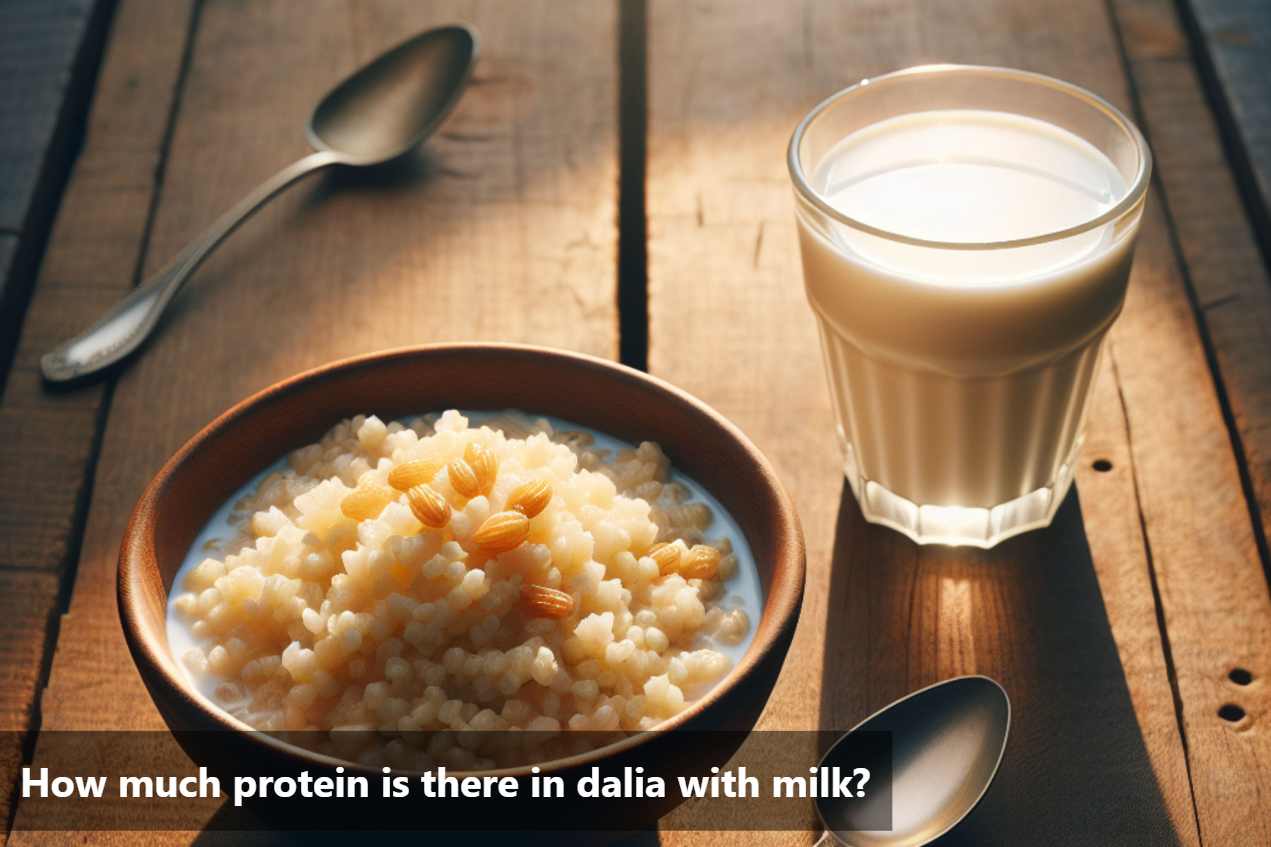
How much protein is there in dalia with milk?
Dalia, commonly known as broken wheat or bulgur, is a nutritious grain that is packed with essential nutrients including protein. When combined with milk, the protein content in this blend increases significantly, making it a powerhouse of nutrition. Understanding the protein content in 100 grams of dalia with milk can provide valuable insight into how this combination can contribute to meeting our daily protein requirements.
By uncovering the benefits of including dalia with milk in our diet, we aim to shed light on a simple yet effective way to boost our protein intake and enhance our overall health.

Nutritional Value of Dalia
A single serving of milk dalia contains:
Calories |
179 kCal |
Carbohydrates |
28 grams |
Dietary Fibres |
3 grams |
Protein |
4 grams |
Fats |
6 grams |
Saturated Fats |
2 grams |
Sodium |
190 milligrams |
Potassium |
133 milligrams |
Calcium |
184 milligrams |
Iron |
1 milligram |
Benefits of Consuming Dalia with Milk for Protein Intake
Incorporating dalia with milk into your diet offers a myriad of benefits for boosting protein intake and promoting overall health.
Including dalia in your diet provides a significant protein boost, aiding in muscle repair and growth. When combined with milk, the protein content is further enhanced, offering a wholesome source of this essential nutrient.
Opting for a serving of 100 grams of dalia with milk can significantly contribute to your daily protein requirements. This combination not only satisfies your protein needs but also ensures a well-rounded nutritional intake.
Consuming dalia with milk is not only about protein content; it also offers a range of essential nutrients like vitamins, minerals, and fiber. This promotes overall well-being and aids in maintaining a balanced diet.
Moreover, the combination of dalia and milk can be a great option for individuals looking to increase their protein intake without relying on meat or other protein-rich foods. It is a versatile and easy-to-prepare meal that can be customized to suit different taste preferences.
Incorporating dalia with milk into your diet can be a delicious and nutritious way to enhance your protein intake and support your overall health goals. Start reaping the benefits of this simple yet effective dietary choice today.
Making Dalia at home
Ingredients:
Dalia (broken wheat): 1/2 cup
Milk: 2 cups
Water: 1 cup
Sugar or jaggery: as per taste
Cardamom pods: 2-3 (optional)
Chopped nuts (almonds, cashews, raisins): for garnish
Ghee or butter: 1 tablespoon (optional)
Instructions:
Rinse Dalia: Rinse the dalia under cold water and drain it well.
Boil Water: In a saucepan, bring 1 cup of water to a boil.
Add Dalia: Add the rinsed dalia to the boiling water. Stir well and let it cook for 5 minutes on medium heat.
Add Milk: Pour 2 cups of milk into the saucepan with the cooking dalia. Stir to combine.
Simmer: Reduce the heat to low and let the dalia simmer in the milk until it becomes soft and creamy. Stir occasionally to prevent sticking.
Sweeten: Once the dalia is cooked and the mixture thickens, add sugar or jaggery according to your taste preferences. You can also add crushed cardamom pods for flavor if desired.
Garnish: Heat ghee or butter in a small pan and roast the chopped nuts until golden brown. Garnish the milk dalia with these roasted nuts.
Serve: Serve the milk dalia hot in bowls. Enjoy it as a nutritious breakfast or comforting dessert.

Nutritional Breakdown: Protein in Milk Dalia
The combination of dalia with milk offers a nutritious and protein-rich option for individuals looking to enhance their diet. Notably, the protein content in 100 grams of dalia with milk showcases the potential of this pairing to fulfill daily protein requirements effectively.
By choosing to consume dalia with milk, individuals can benefit from a convenient, versatile, and delicious source of protein. Whether seeking post-workout nourishment, a satisfying breakfast option, or a wholesome snack, dalia with milk presents a compelling choice.
Emphasizing the importance of this protein-packed duo, integrating dalia with milk into one's regular meals can enhance dietary protein intake and promote a balanced and wholesome nutritional profile.
FAQs
-
Is milk dalia a good source of protein?
Yes, milk dalia is a good source of protein, with approximately 8-10 grams of protein per serving.
-
How does the protein content in milk dalia compare to other protein sources?
The protein content in milk dalia is comparable to that of a glass of milk or a small serving of yogurt.
-
Can milk dalia be a part of a high-protein diet?
Yes, milk dalia can be incorporated into a high-protein diet to increase overall protein intake.
-
Is the protein in milk dalia easily digestible?
Yes, the protein in milk dalia is easily digestible, making it a good option for those looking for a protein-rich meal.
-
Are there any other nutrients besides protein in milk dalia?
Yes, besides protein, milk dalia also contains essential nutrients like carbohydrates, vitamins, and minerals to provide a balanced meal option.
This Blog post is an initiative by Lo! Foods, to provide accurate and Nutritionist / Doctor approved information related to Health. Lo! Foods is India's leading brand for Everyday Functional Foods. Foods designed for specific Health conditions or Needs. Lo! Foods also runs India's largest range of Low Carb Healthy Cloud Kitchens, under the brand names of Lo!, ProteinChef, ATH (All Things Healthy) and DiabeSmart.















Leave a comment
Your email address will not be published.